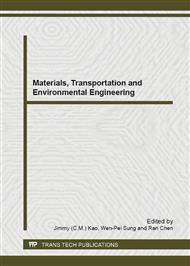[1]
LU Yongming. On the Supply Chain Management in Port Industry [J]. REFORMATION & STRATEGY, 2009(11): 176-178.
Google Scholar
[2]
Dong-wook Song, Photis M. Panayides. Global Supply Chain and Port/Terminal: Integration and Competitiveness[C]. International Conference on Logistics, Shipping and Port Management. (2007).
Google Scholar
[3]
HUANG Qiaomei. Xiamen Port development strategy based on supply chain[J]. Shipping Management, 2011(9): 25-28.
Google Scholar
[4]
Tae-woo Lee, Nam-kyu Park, Dong-won Lee. A simulation study for the Logistics Planning of a container terminal in view of SCM[J]. Maritime Policy & Management, 2002(3): 243-254.
DOI: 10.1080/0308883032000114072
Google Scholar
[5]
LI Zhaokun. Research on Several Key Problems of Port Logistics Service Based on Supply Chain[D]. Dalian Maritime University, (2010).
Google Scholar
[6]
Paixao, A.C. And Marlow, PB. Fourth generation Ports - a question of agility[J]. International Journal of Business Logistics, 2003, 16(l): 189-212.
Google Scholar
[7]
Lee, P.D. Port Supply Chains as Social Networks, Service Operations and Logistics, and Informatics[C]. IEEE International Conference. 2006: 1064-1069.
DOI: 10.1109/soli.2006.328899
Google Scholar
[8]
HUANG Qiwei, JIANG Xiaogan. Supplier selection of port based on a multi-objective programming model[J]. Value Engineering, 2008(9): 61-63.
Google Scholar
[9]
Legato, P. and R.M. Mazza, Berth Planning and resources optimization at a container terminal via discrete event simulation[J]. European Journal of Operational Research, 2001, 133(3): 537-547.
DOI: 10.1016/s0377-2217(00)00200-9
Google Scholar


